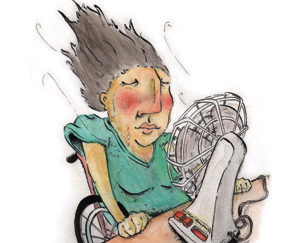
Having been a functional paraplegic and manual wheelchair user for several years, I was used to coping with the semi-regular revolt of my body parts. I’d learned to live with sporadic UTIs, slipping tendons in my thumbs and a cranky patch of skin under my left bum cheek that occasionally likes to become a wound — usually when I’m away from home with no supplies, of course. Then one day I was blindsided by a problem I couldn’t just roll through, the one that turned my life upside down — menopause.
Now, you men who read the “M” word and kept reading, know that you are awesome. No wonder the women in your life love you! Stay with us, gents, and hopefully you will learn some things to make those ladies’ lives a little easier.
And ladies — my sittin’ sisters — I know you’re still here, because you’ve either ridden “the beast” or heard dark tales of your hormonal future. Sadly, wheelers can’t always count on guidance from medical professionals regarding the “M” word, so we have to rely on each other. I talked to some menopausal wheelers who were willing to share their experiences and tips to help you get through your menopause.
Meno-what?
First, the basics — what exactly is menopause? Technically speaking, “menopause” is the point in time when a woman’s menstrual periods have stopped for a full year. It happens because a woman’s ovaries stop producing estrogen and progesterone, usually after age 45. Prior to menopause is a time called “perimenopause,” aka menopausal transition, when your periods become irregular and you can experience a wide array of symptoms resulting from fluctuating hormones. Together they comprise what we’ll call the “menopause experience.”
The bottom line on menopause is that it brings lots of hormone changes, usually over several years, and those changes affect everyone differently. Take the contrasting cases of Kathleen, a T2 para, and Lynn, whose dual C5-T8 incomplete and complete injuries result in functional paraplegia.
“You feel like you are on fire,” remembers Kathleen, a 59-year-old from California. “I didn’t mind it in the winter, when the additional warmth was not bad, but in the summer, it became quite uncomfortable.”
Lynn’s experience couldn’t have been more different.
“I had heard so many women talk about being hot all the time that I was actually looking forward to it,” says the 59-year-old from Canada. “That, sadly, was not my case.”
Regardless of your menopause symptoms, what your body goes through and the symptoms you experience are all part of the normal female aging process. Hormones regulate everything in your body, and it doesn’t take much of a change in them to alter your physical, mental and emotional state. All kinds of things can change.
“My periods got out of whack, which was not normal,” reports Norma, a T10 para from Ontario, Canada. “One of my last periods was over 38 days long and very heavy at times. It was really scary!”
Other symptoms of the menopausal experience may include changes in your bladder — often leading to more UTIs — and also depression, osteoporosis, insomnia, mood swings, heat regulation issues, weight gain, increasingly dry skin and more. If some of these symptoms sound familiar, that’s because many symptoms of menopause overlap with other conditions commonly experienced by wheelchair users.
Unfortunately, there are very few studies on the experiences of menopausal wheelers. If it seems like your doctor doesn’t have good information to give you, that’s because there really isn’t much good information to give.
Doctor, Doctor, Gimme the News
I’m officially menopausal now. When I went through perimenopause, I didn’t know any menopausal wheelers, and I couldn’t find information to help me through the process. I felt isolated, alone and, sometimes, more than a little crazy. My doctor said what was happening was “perfectly normal” and the process would go on for two to 12 years. I love it when my doctors can give such concrete information on my health.
One thing that struck me when talking with menopausal wheelchair users is that most had one thing in common — their doctors never mentioned menopause to them and weren’t very helpful when the topic was raised.
“I feel like it’s dismissed by my doctors,” says Kathy, a 49-year-old quad from Northern California. “I’d like to have been more informed by my doctors ahead of time. I wish someone had given me more information on what to expect and if there are strategies to prevent or combat some of the symptoms.”
Wheelchair users and their doctors can spend so much time dealing with other issues that reproductive health is often neglected. And many female wheelchair users, especially quadriplegics, have difficulty even finding facilities that can physically accommodate them in order to get preventive gynecological care.
“It’s difficult because it seems I’m always at my doctors for a variety of things, and menopause seems to be at the bottom of the list. So it never gets dealt with,” says Lynn.
Fun with Symptoms
Lynn doesn’t hesitate when asked about her worst menopause symptom. “Night sweats!” she exclaims. “I’d wake soaked with a puddle of water between my breasts, needing my husband to turn on the fan. Once I dried, I’d be freezing and would need to wake him to turn the fan off. We soon installed a fan with a remote control and I began to sleep with the remote on my chest so I could turn it off and on, almost in my sleep.”
Temperature regulation is a very common symptom. Hot flashes were also at the top of the list for Kathleen. “I had the concern of getting too hot and then having problems with dysreflexia, which raises blood pressure excessively,” she says. “I got through it with a fan next to me, a ceiling fan and, at times, a cold washcloth on my face and neck. I didn’t want to be prescribed any medication because that just causes other problems, and my solutions helped me.”
Anyone experiencing difficulty regulating body temperature who also has issues with autonomic dysreflexia, MS-related heat sensitivity or other temperature-related complications could face serious discomfort. As Kathleen and Lynn demonstrate, a little planning ahead can help alleviate the issue.
All of that waking up in the middle of the night results in sleep disruption. Many wheelers have issues with sleep quality without the complications of menopause. Between pain, spasms, medication and neurological problems, a good night’s sleep can be elusive. Waking up due to hot flashes, night sweats and other menopause-related issues can drive an already tired wheeler right into the wild world of exhaustion.
“I’ve always had a little bit of a problem with insomnia, but it seems to have gotten worse,” says Kathy. “But the [frequent] waking is really the most aggravating thing now.”
Whether they’re exacerbated by a lack of sleep and/or hormones, mood swings and depression are very common. We thought PMS was bad, but many of us didn’t really understand the power that hormones have over our mood until menopause. Memory issues and inability to concentrate can also be issues for many of us.
Everyone experiences menopause and all its effects differently. Joyce, a 64-year-old C5-6 quad from Florida, didn’t notice any symptoms of menopause when it happened 14 years ago.
“I went through menopause, but it was super easy,” she says. “The only way I knew that it was happening was that my period stopped when I was 50. I didn’t feel anything!”
But Joyce has recently experienced bone breakage due to osteoporosis. She doesn’t know if it was from decades as a quad, decreasing bone density from menopause or some combination of the two. The lack of medical information has been an issue for her.
“For the osteoporosis there is no real data,” says Joyce. When doctors suggested she take medicine for it, she found a complete lack of information on possible issues or benefits for a quad taking the drug. “There’s no research to tell us if it’s even going to help us. It’s crazy.” [See “Para/Medic: Fracture Risk and Treatment Options with SCI,” April 2016]
One thing we do know is that wheelers have an increased risk of osteoporosis and that menopause increases that risk even more. Exercise can help — it can also level out your mood, decrease depression, combat weight gain and more. Women are especially at risk of vitamin D deficiency during and after menopause, and it can also affect your mood. Talk with your doctor about whether exercise, dietary changes, calcium supplements, hormone replacement and/or medication may be right for your body and lifestyle.
Weight gain is another symptom of menopausal life. It can be exacerbated by joint pain, which may limit movement, as well as by other health concerns. Kathy lists weight gain as one of her primary issues, and degenerative joint disease limits her ability to exercise. She has been working with a nutritionist and dieting for a year and a half but has not been able to lose weight.
Another issue for wheelchair users undergoing the change is skin integrity, as skin tends to become drier during menopause. It’s more important than ever to do daily skin checks and moisturize.
Menopause can also lead to bladder changes that increase your chances of UTIs and/or incontinence. I suddenly started getting more UTIs even though I had not changed anything in my bladder care. Hormone treatment was an option presented by my urologist, but since hormone treatment can increase the chance of breast cancer, which I had already experienced, I declined. I changed my bladder meds, increased my liquids and started using an essential oil called clary sage — and my UTIs decreased.
Where Do We Go From Here?
So, what’s a wheeler to do? Your first step is to get educated. Understanding how your body works can help you understand and address menopause symptoms as they arise. Your doctor may not bring menopause up, so make it a priority to talk with her about it and discuss what options may be best for you and your health, whether that be medication, meditation or marathons.
“I think we have to be the ones to initiate talking to our doctors about things that we are going through,” says Kathy. “We have to initiate the menopause conversation — you have to be assertive because your doctor is not going to bring it up.”
Your education needs to include those around you as well — anything you go through affects those close to you and understanding the facts will help them cope.
“Men or partners should be educated on it as well,” recommends Norma. “I have heard menopause compared to puberty and all the talks that go around it — those talks should happen around menopause as well. It is normal and not a taboo subject.”
Don’t be afraid to try different techniques to combat your symptoms. Fans were the cooling tool of choice for many of our wheelers, but I found that applying clary sage essential oil externally twice a day kept my hot flashes at bay and seemed to help my bladder symptoms. Talk to your physician, menopausal friends and family to learn about strategies that may work for you — everyone is different, so keep trying until you hit on what works.
And go easy on yourself. Menopause is a normal part of life that you have limited control over — just try to find strategies that make you feel as healthy and happy as you can.
Kathleen sums it up best, “Get adequate sleep and love and enjoy the changing new you!”
Resources
• “How Does Menopause Affect Women with MS?,” everydayhealth.com/multiple-sclerosis/symptoms/menopause-women-with-ms
• “Menopause and the SCI Woman,” mobilewomen.org/2016/04/menopause-and-sci-woman.html
• “Surviving the Change — Menopause and Women with Disabilities,” wwda.org.au/issues/health/health1995/menop1
• “Women’s Issues,” United Spinal Resource Center, bit.ly/2P9GdO0
** This post was originally published on http://www.newmobility.com/2019/05/wheeling-through-menopause/

